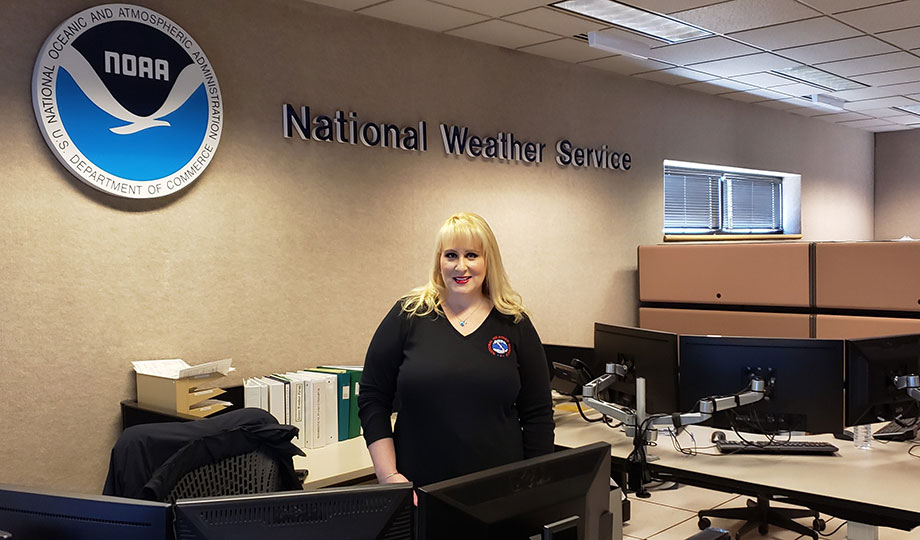The College of DuPage Meteorology Program is like no other meteorology program in the nation. Whether you are interested in forecasting, severe weather or more traditional atmospheric sciences, COD gives students of all ages a chance to delve into how the atmosphere works from the start of their academic career.
Students who are interested in earning a four-year degree can follow the Meteorology Transfer Pathway and transfer to another school as a junior with a wealth of experiences and a top-quality education. Students can also earn a certificate in Weather Hazards and Preparedness.
Climate and earth sciences courses are both challenging and fascinating for students who would like to learn more about meteorology in relation to other careers.
Determine Your Path
Meteorologists conduct research, teach students, provide consulting services and forecast the weather. Meteorologists often work for the government through the National Oceanic and Atmospheric Administration (NOAA), universities and private companies.
You want to attend a credible college that stands out from the rest. At COD, you'll discover:
- Small class sizes that ensure students receive personalized attention.
- Dedicated instructors with years of professional experience.
- Affordable programs to help students achieve success without creating overwhelming debt or draining a savings account.
- Instruction utilizing top-notch facilities.
- An innovative transfer program that facilitates a convenient, affordable and streamlined approach to earning a bachelor's degree.
Meteorology Transfer Pathway
The Meteorology Transfer Pathway, Associate in Science degree program represents a typical course schedule or sequence for a student planning to complete the Associate in Science degree within two years, then transfer and major in a specific discipline.
Weather Hazards and Preparedness
The Weather Hazards and Preparedness, Certificate explores physical causes and effects of extreme weather and climate, along with societal mitigation, preparedness, and response to hazardous weather events.
COD Trailblazer: Meet Karissa Klos

Karissa attended COD to fulfill a science credit. With the support of her professors, hear how she fell in love with meteorology and is now the Director of On-air Operations at Weather Nation.
Get Started Today
The first step to getting started in meteorology is to apply for admission.
Academic and Career Pathways give you a roadmap to achieving your career goals. Follow a pathway based on your degree or certificate that outlines which classes you need to take and when so you graduate on time or move on to the next phase in your career.
Earth Science Program graduates will:
- Identify the risks, societal impacts, and appropriate responses to earth-related processes that may include geological, astronomical, atmospheric, and hydrological issues.
- Examine and explain the interrelationships among at least two of the following systems: geological, astronomical, atmospheric, and hydrological.
- Apply the scientific method within the context of the Earth Sciences.
- Select appropriate resources to evaluate current societal issues.
- Integrate knowledge of fundamental Earth Science concepts with social concerns regarding the sustainability of natural resources and/or the risks associated with natural hazards.
College of DuPage partners with several four-year institutions to help students seamlessly complete a bachelor’s degree in earth science. Students can connect with Transfer Services for personalized guidance on transfer opportunities.
For more information about Transfer Pathways, visit the College of DuPage Catalog. The pathway outlines a typical two-year course plan for completing an AA or AS degree before transferring to a four-year program. Course requirements vary by institution, so consult your faculty or academic advisor for specific guidance.
Articulation Agreements
College of DuPage maintains transfer agreements with many colleges and universities to ensure a smooth transition toward a bachelor’s degree. These agreements often include a defined course sequence. Students should regularly meet with a faculty member or Advising Services to stay on track.Transfer Guides
Beyond articulation agreements and guaranteed admission programs, College of DuPage courses transfer to many other institutions. Transfer Guides help students select COD courses that meet prerequisites for specific majors and include details such as contact information, major requirements, general education requirements, and transfer policies.
Career Information
Explore careers based on your interest, location and salary range or view top occupations by income.




